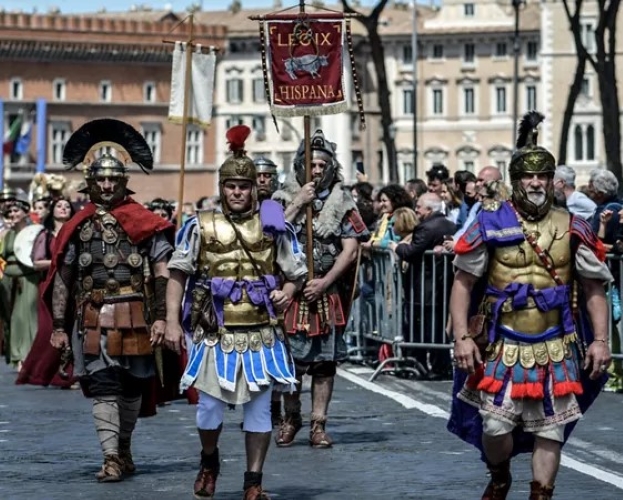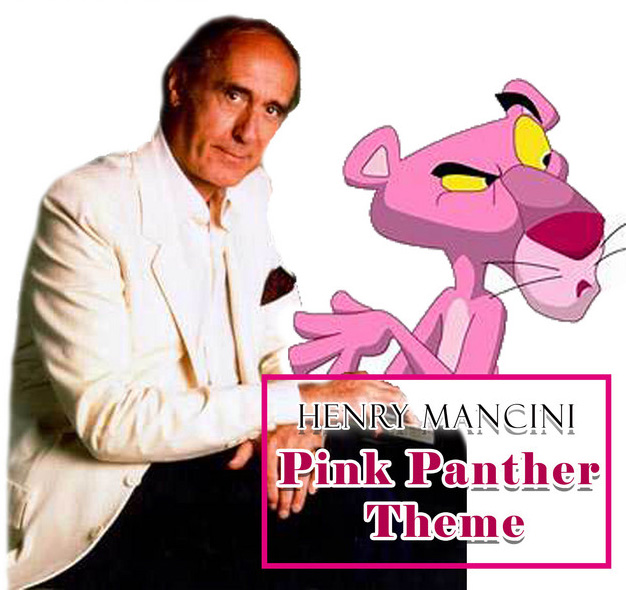What a week it has been. Today is the birthday of Rome, the Eternal City – 2,777 years young. April 16th was composer Henry Mancini’s 100th birthday (Rest in Peace), and April 17th the 500th anniversary of explorer Giovanni da Verrazzano’s arrival in New York Harbor, eighty-five years before Henry Hudson. Together, these anniversaries reflect just a small part of our enduring contributions to civilization and humanity.

Rome still calls itself Roma Aeterna – quite a distinction from the ‘Big Apple’ or the ‘City of Lights’ (Paris). Urban symbols like the Statue of Library or the Eiffel Tower don’t convey the shock value of Rome’s legendary She-Wolf suckling two human infants – in your face, world! Rome is a city that still carries the flame of a bygone republic in the immortal letters SPQR (the Senate and [Que] People of Rome), even engraved on the city’s manhole covers. What other city can claim to be the seat of Western Civilization and Christianity? Italy is our motherland, but Rome is her father, her creator. Be proud!
From that same motherland came Giovanni da Verrazzano, a navigator and explorer from the landlocked city of Florence. Like Columbus and John Cabot, Verrazzano went to sea and eventually sought employment outside of Italy. He was hired by the King of France to find a way through the still mysterious North America to the Orient. In 1524, he sailed along the coast from North Carolina to Newfoundland. On April 17th he entered New York Harbor and met the Lenape natives living there. Continuing to follow the coastline he began christening sites in the name of France, including Cape Cod (which he named Pallavicino), and into Canadian waters. He must have concluded that the Nova Scotia/Newfoundland area held the most promise for a passage to Asia. He returned to France on July 8th announcing his deeds and producing a map of the explored coast that he named Francesca (or Nova Gallia), after the French King.
France now had a claim to North America that overlapped Cabot’s English claim. Ten years later France sent Jacques Cartier to follow up Verrazzano by entering the St. Lawrence River. Meanwhile, the English waited until 1620 to plant a colony at Plymouth. Even that was an accident, as the Pilgrims were originally headed for Virginia. Thus began the long conflict between England and France for North America. Each nation had an “Italian” claim.

Now to modern times. When I was younger, strangers would ask if I was related to Henry Mancini the composer (I am not). Newer generations aren’t as familiar with Henry. His music was tied to movies and TV shows that aren’t viewed as much. Last week, Turner Classic Movies (TCM on cable) observed Mancini’s 100th birthday with a series of movies with his scores: Breakfast at Tiffany’s, Days of Wine and Roses, Dear Heart, and Pink Panther, among others. The most memorable songs of these – Moon River and the Pink Panther Theme – went viral and are still among the classics being sung or played today. For TV, Mancini is famous for the theme songs of Peter Gunn, Mr. Lucky, The Bob Newhart Show, Remington Steele, and many more.
Born Enrico Nicola Mancini, son of Italian parents from Abruzzo and Molise, Henry served in WWII, a protégé of then-Major Glenn Miller. His post-war career was energized by his mastery of musical and orchestral composition. To quote Wikipedia: “Often cited as one of the greatest composers in the history of film, he won four Academy Awards, a Golden Globe, and twenty Grammy Awards, plus a posthumous Grammy Lifetime Achievement Award in 1995.”
It is easy to understand how Jewish composers dominated American music, their numbers and talents are undeniable; but Italian Americans like Harry Warren (Salvatore Guaragna), the Broadway and movie composer of the 1930s – 1950s, as well as Henry Mancini, contributed much to our American musical heritage.
I wish that more Americans who identify as ‘Italian’ learn about what came before them. Scratch the surface of any field of endeavor in any century and invariably an Italian can be found. -JLM

This is so timely as I was rummaging through Google last night thinking about the lesser known gems Mr. Mancini composed in his later years including wonderful songs for the movie “10” and the Jack Lemmon angst senior citizen baptism That’s Life. The latter was sung by Tony Bennett. He also went out on a limb with an unusual outre score for the Audrey Hepburn film Wait Until Dark. It’s not hyperbole for me to admit that I chose a career in music inspired not only by his heritage, but an elegance in style. He seemed to be the voice of my adolescence on so many levels. I look back in gratitude for the many song stylists of my youth as well. What a refuge and anchor they were for me, especially given what we have faced from the media.
Another footnote of trivia that might interest our members is that one of “Hank’s” composition teachers was Italian-Jewish emigre Mario Castelnuovo-Tedesco. (Why Jewish families would name Mario eludes me). He came to Hollywood in 1939 and had to work as a ghost writer for films as he was subjected to the anti-Italian-alien restrictions during the war. Unfortunately for him another restriction on his freedom. He composed a beautiful guitar concerto BTW, one of my favorite pieces.